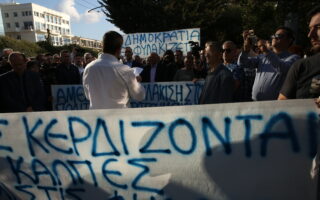What comes after the conviction?

Things are judged by results, and in the case of Fredi Beleri, things have not gone at all well. The mayor-elect of the predominantly ethnic Greek town of Himare in southern Albania is to remain in prison until September 12, 2024. Albanian Prime Minister Edi Rama’s goal is for the appeal trial to be finished by September too, so that Beleri can be convicted once and for all and disqualified. Rama can then call fresh elections in Himare and is hoping that the climate of fear and various forms of pressure will allow a mayor of his liking to be elected.
The Americans and the Europeans are still not convinced that the Beleri case is a question of democracy and rule of law, and a violation of human rights. Furthermore, with the exception of certain resolutions put forward and coordinated by Greece, no serious international organization has gotten behind the case (such as, for example, the high commissioner for national minorities at the Organization for Security and Cooperation in Europe). Nor has anything been written about the case in the high-caliber international media. Even nongovernmental organizations that have so much to say on other similar cases have not made a peep on this issue. The Albanian prime minister has, basically, felt that he is under no international scrutiny whatsoever. The only pressure that has been exerted on Albania has been thanks to Greece, and that has come at a diplomatic cost.
Yet the Beleri case has all the hallmarks of an affair that should pique the international public’s interest. Major economic interests bankrolled by drug money systematically trespass – with Rama’s blessing – on private properties in an area of particular natural beauty that is home to an ethnic minority. A representative of this community runs for mayor and is arrested two days before the polls on spurious charges. Despite this atmosphere of intimidation, he is roundly elected by the town’s constituents. He is held in prison for 10 months for an affair worth 340 euros and is prohibited from being sworn into office. His trial is a parody, but it still ends in a conviction for the mayor-elect by a court chaired by a judge who is known to have entered Greece illegally in the past. In the meantime, the loser of the local election, also the prime minister’s choice, continues to serve as mayor of Himare. It’s certainly a very catchy case, but we still haven’t managed to make anyone else care.
So now that Beleri has been convicted, the question is what Athens intends to do, particularly as we are at risk of being regarded (as we have been in the past) as part of the Balkan problem. Greece and Albania have two key disputes. The first has been dragging on for years and it concerns the rights of the ethnic Greek minority and their protection. Rama’s role in the Beleri affair has unintentionally brought the matter back to the fore. The second dispute has to do with the delineation of maritime zones between the two countries, which re-emerged after Tirana backed out of the agreement signed in 2009.
Rama has been fast evolving into the kind of leader with autocratic traits similar to Turkey’s Recep Tayyip Erdogan or Russia’s Vladimir Putin
One avenue Athens could pursue is laying the Beleri matter to rest by arguing that it was a lost cause we never should have gotten embroiled in. We have done as much on several occasions with Albania in the past. With constant displays of extreme “European superiority,” we have accepted all sorts of backpedaling and concessions because we were able to secure our interests in other matters. For years we purported to be just a couple of steps from reaching some kind of agreement on the maritime zones, letting the issue drag on. We even kept the 2009 agreement from being ratified by Greece’s Parliament for the sake of this prospect. We even went a step further under the SYRIZA-Independent Greeks government, acting as if we had somehow cheated the Albanians and needed a new deal, when the 2009 accord is actually a paradigm of maritime delineation. It draws the line between the two countries’ coasts; it grants complete influence over the islands in each jurisdiction; it is mutually beneficial by upholding the provisions of the Law of the Sea to the letter; and it confirms Greece’s long-standing positions on maritime zones. What’s more, it is evident that Turkey lay behind Albania’s decision to back away from the deal and this is why, unless serious pressure is brought to bear on Tirana, an agreement will never be reached.
As for the Beleri affair, the only way forward for the Greek side is a policy guided by principles. We lose credibility when Albania violates fundamental principles and obligations, and without consequence. Furthermore, Tirana does not understand goodwill gestures; it takes them as a sign of weakness. If we back down on matters of principle like the rule of law, democracy or the protection of minority rights, what kind of message would that send to Turkey (but also our allies)?
If we limit the issue to the bilateral sphere, we will indeed be a part of the Balkan problem. It is our obligation, therefore, to highlight its European dimension, but also to take a fresh look at our relations with Albania (and to dust off the signed agreement of 2009). And one more thing: On the subject of principles, Rama has been fast evolving into the kind of leader with autocratic traits similar to Turkey’s Recep Tayyip Erdogan or Russia’s Vladimir Putin, and Europe must stop this progression in its tracks.
Angelos Syrigos is a New Democracy MP and associate professor of international law and foreign policy at Athens’ Panteion University.





